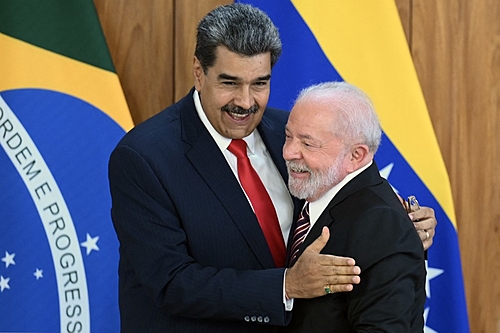
All 12 South American countries will be represented in Brasília this Tuesday (30th) in a meeting promoted by Brazilian diplomacy. With that, President Luiz Inácio Lula da Silva (PT) resumes efforts to create spaces and possible mechanisms to strengthen integration in the region, hampered in the recent past by ideological polarizations and breakdowns in diplomatic relations.
Lula will receive presidents Alberto Fernández (Argentina), Luís Arce (Bolivia), Gabriel Boric (Chile), Gustavo Petro (Colombia), Guillermo Lasso (Ecuador), Irfaan Ali (Guyana), Mário Abdo Benítez (Paraguay), Chan Santokhi (Suriname), Luís Lacalle Pou (Uruguay) and Nicolás Maduro (Venezuela) for a meeting at the Itamaraty Palace, in Brasília. The only absent representative is Dina Boluarte (Peru), who faces constitutional impediments and will be represented by the president of the Council of Ministers, Alberto Otárola.
Aware that regional integration is a flag that carries a considerable ideological load, the Brazilian government plans to hit the key of the commercial flow, showing that regional integration is, above all, a way to warm up the economies of the South American countries, promoting economic growth, job creation and other benefits.
:: The return of Brazil and Argentina to Unasur: a reintegration of South America? ::
According to the Economic Commission for Latin America (ECLAC), 2011 was the peak year for intra-regional trade in goods between Latin American and Caribbean countries, surpassing US$ 200 billion. Since then, the figure has been falling so much that, in 2020 (last data available), it was already at around US$ 136 billion, a level similar to that of 2006.
To mention only the bilateral relationship between Brazil and Venezuela, the trade balance reached records during Lula’s first terms (2003 to 2010), such as that recorded in 2008, when Brazilian exports exceeded US$ 5 billion. On the other hand, between 2017 and 2022, the trade balance reached the lowest levels of the last 20 years.
Lula and the advisers assigned to work at the summit meeting in Brasilia will try to show that the reduction in intra-regional trade has been harmful in the recent past, because transactions carried out between South American countries are more diversified and have more added value than with partners. from other places in the world. The quality of the exchange would be higher.
The starting point used by the Brazilian government is the assessment that, in broader clashes of global hegemony, the attempt to build a bipolar narrative is negative for developing countries, which in turn can benefit from the multilateralism of regional blocs. The idea is that the blocs play an important role, because they allow negotiating in a unified way with the hegemonic powers – therefore, in better conditions.
And those who try to negotiate individually end up doing badly. According to a source at the Planalto Palace, an example of this would be the situation in Uruguay, which tried to negotiate a free trade agreement with China, but saw the Chinese put their foot on the brakes when Lula returned to the presidency with a speech that South America should negotiate as a block.
:: In Uruguay, Lula tells Lacalle Pou that he supports a trade agreement with China within Mercosur ::
You need to act fast
Brazil wants to resume the integration process quickly to take advantage of the favorable situation, that is, the fact that there is a significant number of presidents from the progressive field in the region, such as Lula, Alberto Fernández, Luís Arce and Gabriel Boric. In Planalto’s assessment, the right wing opted to interrupt the integration process – and even ideologized the issue – by dismantling the Union of South American Nations (Unasur) and creating the Forum for the Progress of South America (Prosul) , founded in 2019, during the government of Jair Bolsonaro.
At that time, the region had more right-wing governments and a radicalized discourse was gaining strength, combating the programs implemented by left-wing governments. Today, according to the assessment of the Brazilian government, there is a self-criticism in countries that were recently governed by the right that integration has to be perennial, persisting through political cycles. This is because socioeconomic conditions have worsened, evidencing the losses of not having a consistent integration mechanism. Therefore, the conditions would now be in place to institutionalize this process of deepening integration, with a view to forming a South American identity.
The one
Created in 2008, at a time when the left was on the rise in the region, Unasur had 12 countries as members. The alliance frayed as the ideological pendulum swung to the right a decade later. Between 2018 and 2019, Colombia, Argentina, Brazil, Chile and Paraguay left. Last month, however, Lula signed a decree officializing Brazil’s return to the organization.
Brazil returned to Unasur because it considers it to be the best-finished forum for integration, with convergence of interests, elaborated from a lot of technical and programmatic work. But the summit called by Lula will serve to hear the opinion of the five countries of the subcontinent that are outside: Uruguay, Paraguay, Chile, Colombia and Ecuador.
“The idea is to resume dialogue and cooperation with South American countries. Identify common denominators. The region has capabilities that will be key in the future of humanity, such as natural resources, water, minerals, area for food production. A concrete agenda of cooperation can be started immediately,” said Ambassador Gisela Figueiredo Padovan, secretary for Latin America and the Caribbean at the Ministry of Foreign Affairs, during a briefing on the meeting at Itamaraty.
crisis everywhere
The summit meeting takes place at a time of strong regional instability. Peruvian Dina Boluarte is involved in an impeachment process and will not be able to be in Brasilia. In Ecuador, Guillermo Lasso also underwent an impeachment attempt, to which he reacted by decreeing the dissolution of Parliament and bringing forward elections.
In Colombia, Gustavo Petro a few weeks ago denounced that they were plotting a coup against him. In Chile, there is a strong clash over the drafting of the new Constitution, a process that started driven by popular movements and ended up “kidnapped” by the extreme right.
In Argentina, the economic crisis reaches dramatic proportions, with a lack of international currency, and there are presidential elections on the horizon, permeated by uncertainty about who will be the names in dispute. These are situations that can reinforce the Brazilian point of view that integration is the best way to strengthen the countries in the region. Now, it remains to be seen how this point of view will reverberate during the summit.
Editing: Nicolau Soares
Source: www.brasildefato.com.br

